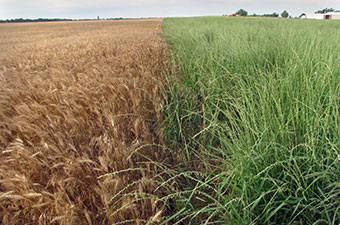landinstitute.org/our-work/peren...erennial-crops/

Perennial plants do not have to be reseeded or replanted every year, so they do not require annual plowing or herbicide applications to establish.

Annual wheat on the left, and Kernza® on the right.
Perennial crops are robust; they protect soil from erosion and improve soil structure. They increase ecosystem nutrient retention, carbon sequestration, and water infiltration, and can contribute to climate change adaptation and mitigation. Overall, they help ensure food and water security over the long term.
Many fruit, forage and some vegetable crops, including fruit trees, alfalfa, grapes, asparagus, and olive trees, are perennials that have been grown for thousands of years. The Land Institute is working to add perennial grains, legumes, and oilseed crops to the list.
Perennial grains, legumes and oilseed varieties represent a paradigm shift in modern agriculture and hold great potential for truly sustainable production systems. In addition to identifying and developing perennial food crops, The Land Institute also conducts ecological intensification research in order to put those crop plants into diverse mixtures called polycultures that mimic the benefits found in native and natural ecosystems.
We are using two approaches to breed perennial grain, pulse, and oilseed crops:
- Domestication of wild perennial plants
- Perennialization of existing annual crops